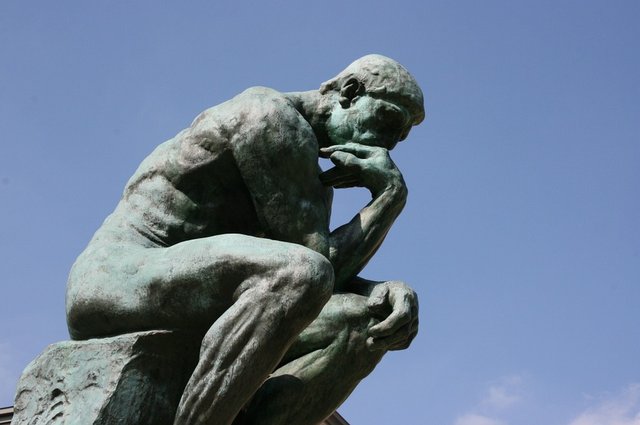"Scientificism" - Social Obligations of Science
The problem started when someone said "the funds may only be used to buy scientific equipment not furniture", even when the Faculty was just opened at a new building (thus, empty!). He was not able to convince the bureaucracy that scientists needed places where to put that scientific equipment and also typewrite¹ the reports. Then, he asked for permission to buy anti-gravitational supports and phoneme transcriptors. It sounded like top gear, therefore, the bureaucracy granted the permission. And that is how a guy named "Rolando García" managed, during the early 60s, to gear up the new "Facultad de Ciencias Exactas y Naturales" in Buenos Aires. He got tables (devices that support things against gravity) and typewriters² (machines that transcribe human phonemes into paper).

Rolando did not discover an elemental particle, but he mocked bureaucrats, that, under my point of view, adds up a lot of score in his favor. If, just like that, he'd showed himself to the Hollywood's Academy (or Sweden's, I still don't have very clear which one is which) and requested a Nobel, he'd get my vote. It turns out that Rolando García as many other scientists of that era, was not interested in the Nobel. Furthermore, they started questioning the Nobel as a later objective in scientific research asking themselves "what is science for?", whom it serves, and whom should it serve; especially at a South-american country as mine. Of course, back then, an argument that prevails today started.
WARNING: the following is not a traditional science article of the kind "mom! mom! why do peanuts dance in beer?". It is more of a meta-science article, which is a way to tag studies about science. This is, where science IS what is being analyzed.
So...
Lets go on talking about Rolando & friends.
It turns out that Rolando & Friends were none of the following:
- A Rock band.
- A bunch of morons.
- Enthusiastic conformists.
- So "friends".
They were actually part of a "school of thought": A group of people with a high intellectual caliber that debates about specific topics and states ideas based on agreements and differences. In this case they conformed the school of thought "Pensamiento Latinoamericano en Ciencia, Tecnología y Desarrollo" (Latin-american thought in Science, Technology and Research). Because the base idea that joined them was basically this: "Argentina is an underdeveloped country and it's a scientific obligation to contribute to it's development".

Hold on a second! Are you telling me I cannot research whatever I like, either dinosaurs or the unveiled misteries of Beef Tripe³?
I cannot. Neither could them. More or less; actually, it depends whom you asked to.
Rolando, that was the Dean of that University during that age that was called "Golden" starting in 1955 until that nefarious moment for Argentina Science the Night of the Long Batons in 1966, would've said "no", you cannot, that in the case he didn't lose an argument back in '58, the CONICET would not be what it is today and it'd look more like an organism that sets up objectives to research on behalf of national interests... Instead of being a place that gathered scientists from the whole country so that they may show off how cool their papers are, and chatter how the idea came up to them; along asking for money for further research.
If you asked Oscar Varsavsky, he would've asked if you considered yourself a rebel scientist. If you replied "yes" he'd reply that your mission was to do science for freedom: Analyze the problem of how is the social change performed and what is needed to do so. If you said "no", he'd tagged you as a "scientifiscist", of being a scientist that adapted into the mold of the current market abandoning any concern of how his work impacts in society.
Curious fact: Two out of three of this kind, deny being so... The third one pretends he didn't hear the question.
Rolando did not agree with that varsavskian concept of "research for revolution or nothing".
If you asked Jorge Sábato, physicist of the CNEA (National Atomic Research Committee), he would've said: "I can't believe you asked Oscar⁴ first". Once he calmed down a bit, he'd explain to you that for him the most important thing for him, is that the country developed an autonomous decision of what to research or not. That there wasn't any socialist prerequisite to achieve technologic sovereignty.

The rest of the club also had different, individual ideas
What is clear is that they conformed a broad array of intellectuals that shared the idea: "Science and technology are the basic tools to overcome problems". Understanding development not only as economic growth but also as a fairer, equitative society. That argument was interrupted when the economic neo-liberalism rose into power by force (also known as Civil-Military Dictatorship), as soon as the conversation was able to be resumed later thanks to Democracy... It was Slapped back down by a corrupt President (We love you Menem! That is Sarcasm).
Only during this last years, under the protection of a society that confers the Government more responsibilities, we were able to remake this discussion. The bad thing is that it's still an Intellectual Argument, the kind that smoking pipe and drinking coffee sneaks a word in another language every few paragraphs, so... the ideas have not gone deep into labs, institutes and research centers. (let me reload my pipe, this tobacco is awful; mon dieux!).
- Typewrite is what Clark Kent did at the Daily Globe as he pretended to work.
- Typewriter is what comes out from locking up a computer and a printer in a room along with a couple of beers; put some music on, and wait for the crossbreed.
- Why is it shaped like that? Who the heck likes this? In what moment of evolution appears the last common ancestor between it and a towel?
- This sentence, from a strictly scientific point of view could be not literal, thus, made up.

If you liked this post and its informal way of talking about sciences, please, follow me for more!
Leave a comment either for good or for bad reviews. I take everything as constructive, and I really appreciate the feedback, even from trolls (at least a troll read it before being himself!).
Copyrights:
All the previously used images are of my authory or under a CC0 license (Source: pixabay), unless openly stated.
All the Images created by me possess a WTFPL licencing and they are free to redistribute, share, copy, paste, modify, sell, crop, paste, clone in whatever way you want.
Excellent post published thank you very much
Science is fun. Science is curiosity. We all have natural curiosity. Science is a process of investigating. It's posing questions and coming up with a method. It's delving in.
Kudos to Rolando for his creativity
Here, we've a saying "Lo atamos con alambre": It pretty much means, "we tie it up with wire" (could be translated as "trust me, I'm engineer?). Highlighting the natural skill we're born with: being able to improvise anything out of anythingelse; either situations or objects. For a greater benefit.
For example, yesterday the power went out at the whole city... I made an oil lamp, since I had no candles... with a can of beans, cooking oil and some thread.
One needs to improvise when necessity is around.
Right, necessity is the mother of invention